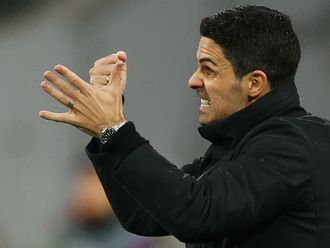London: It was a high point at the most curious of times. In 2011, long after Scotland’s national team had slid away from finals participation and its players had been revered in the English top flight, a minicoaching phenomenon was in play. Seven of the Premier League’s 20 managers were Scottish.
To say nothing lasts forever is gross understatement in these short-term football times but the onset of season 2017-18 still provides a grim line in the sand. There will not be a single manager from north of the border when England’s top division gets under way, breaking a record of at least one per seasonal start which stretches back to the league’s 1992 rebranding. The run is technically even longer, given Sir Alex Ferguson took over at Manchester United six years earlier. Context is of course necessary; only five of those in Premier League office are English.
Ferguson, one of two Scottish managers to win the Premier League, the other Kenny Dalglish at Blackburn Rovers (no English boss has ever won the title), is pivotal to this issue.
His success — domestically and, crucially, in Europe — at Aberdeen almost single-handedly put Scottish managers back on the map after Jock Stein’s monumental efforts at Celtic more than a decade earlier. Jim McLean performed similar 1980s heroics against illustrious opposition when at Dundee United but, unlike Ferguson, was never prised south. As Ferguson’s star rose so, too, did his ability to influence which managers were appointed elsewhere. It was almost like a Godfather effect. Many of them, naturally, were Scots, right to the point of his succession at Old Trafford.
Even Ferguson’s words were important; as a huge advocate of Scottish coaches and their methods, when he spoke others listened.
“I would put it down purely to the fact there was a very talented period of Scottish managers, led of course by Sir Alex — no doubt that spawned opportunities for others,” says Roy Hodgson, a man experienced in the Premier League and the famed coaching schools presided over by the Scottish Football Association. “There were also very, very good Scottish players [in England] who finished tremendous playing careers by going on to become managers. I don’t really see anything in it other than maybe that was a golden generation.”
Alex McLeish was one of that class of 2011, albeit he admits the controversial switch from Birmingham City to Aston Villa likely hampered his career. McLeish remains one of the most knowledgeable, dedicated and experienced Scots on the football market — by way of playing and coaching — yet has found passages back to England blocked since departing Nottingham Forest in 2013. His willingness to work was illustrated by subsequent stints in Belgium and Egypt.
“There are a lot of foreign players in the Premier League,” McLeish says.
“Maybe owners think English or Scots guys can’t handle that but I walked into a dressing room [at Rangers] after Dick Advocaat and galvanised a group low on confidence; Dutch players, Italian players, Scots, World Cup semi-finalists. “You look at what David Wagner did at Huddersfield, for which you’ve got to hand it to him. On the back of that, Norwich bring in the same kind of influence [Daniel Farke]. Whether it is a fad or whatever, it is certainly very current; foreign coaches are definitely the ones in vogue. But I was always taught by my mentors never to feel inferior to anyone in a coaching sense.” Perhaps individual cases mattered more than anyone realised at the time but the woes of David Moyes, for example, in Manchester came after what the Scottish coaching guru Craig Brown describes as a “wholly unblemished record”.
Did negative publicity surrounding Billy Davies or Malky Mackay resonate? There were also epic Scottish falls from grace after Premier League peaks; George Burley and Owen Coyle offer cases in point. Evidence of a decline in the perception of Scottish managers is strong. Robbie Neilson left Hearts, then second in the Premiership, to join League One MKDons. Although there was an element of believing he had done as much as he could in Edinburgh, Neilson was also aware of the possibility of greater exposure to top English clubs from within the Football League. Alan Archibald, who excels on a shoestring budget at Partick Thistle, has been linked with Swindon Town. Derek Adams found himself in League Two with Plymouth Argyle despite success at Ross County and Neil Lennon — not a Scot but intrinsically linked to its football scene — defeated Barcelona when guiding Celtic to the last 16 of the Champions League but found his next movie to be a chaotic scene in Bolton.
Derek McInnes almost bucked the trend recently before rejecting the overtures of Sunderland; a sense remains that the Aberdeen manager will be lucky to be offered a job by a bigger club.
McInnes already floundered at Bristol City.
Every time a club seeks a manager it doesn’t look, as in the past, to the British Isles; it looks to the whole world.
“I don’t think you can link managers in the Premier League to quality of coaching in Scotland or courses offered there,” Hodgson adds.
“The Premier League is awash with money. Every time a club there seeks a manager it doesn’t look, as in the past, to the British Isles; it looks to the whole world. There are only 20 clubs in an enormous Premier League market. But it’s nothing to do with the coaching; both the English and Scottish Uefa Pro Licences are among the most highly regarded in Europe.
“The message I’d give coaches is not to take it personally and not regard it as a reflection on their abilities. When the English club looks, sees a manager with Champions League wins on a CV and the other guy has been managing a Scottish club, unfortunately those CVs as far as owners are concerned don’t match up.” Scottish managers retain traits that should, in theory, be attractive. The nation’s work ethic remains formidable. Those in charge of clubs even in Scotland’s top division have to work within fierce budgetary constraints, meaning recruitment is fundamental; even a £70,000 annual player salary cannot be wasted. A relative shortage of staff means managers in Scotland have to cover a multitude of roles. The intensity surrounding Scotland’s bigger clubs has an obvious impact on the need for mental strength. What Ferguson, McLean and latterly Lennon enjoyed was the boosting of a reputation via Europe. With the Scottish league now viewed with an element of derision from England, there has been no consistent European performance as a counterpoint. Celtic aside, Scottish teams have failed woefully against overseas opposition recently. So as the question would be with players, is the Scottish managerial predicament in England only a brief cycle? “You hope so,” says McLeish. “But at the moment it looks a little bleak.” Such sentiment is ominously familiar.











